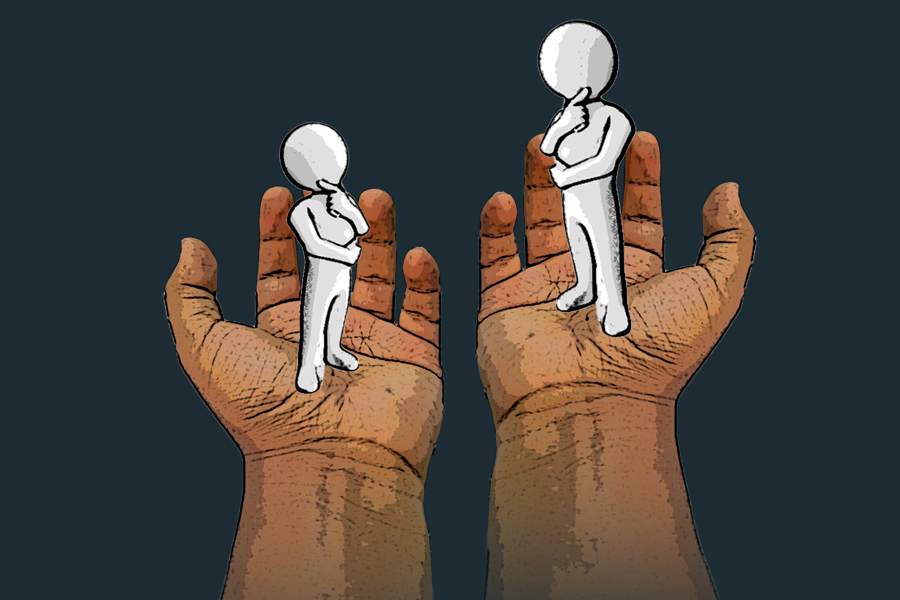
Viewpoints | Jul 26,2025
 Scrolling through social media triggers envy. That friend's stunning apartment makes our furniture choices seem dull, and the colleague's constant travels put our relaxing weekend at home to shame. This relentless comparison game is not just a social media phenomenon; it is a human habit we have had since childhood. We romanticize our struggles and believe others have better lives, echoing the saying "The grass is always greener on the other side."
Scrolling through social media triggers envy. That friend's stunning apartment makes our furniture choices seem dull, and the colleague's constant travels put our relaxing weekend at home to shame. This relentless comparison game is not just a social media phenomenon; it is a human habit we have had since childhood. We romanticize our struggles and believe others have better lives, echoing the saying "The grass is always greener on the other side."
But here is the problem: social comparison creates a skewed perception of reality. We only see the reels of others' lives, the vacations, the promotions, the new cars. We rarely see the struggles, the rejections, the financial burdens. This creates an illusion that everyone else is winning, while we are falling behind.
Psychologists call this "social comparison theory," and it boils down to this: we assess our worth by looking at others. As an independent self, we naturally focus on our own experiences. Our sense of self reflects and forms our worldview, feels pain, and tries to navigate social and physical environments. Primarily concerned with our well-being, we tend to be less attuned to the experiences of others.
We learn how to perceive the world from our environment. No one is immune from external influences shaping our thoughts, behaviours, and decisions.
Children measure their success by comparing toys, clothes, and school supplies. When selecting schools for our children, checking if other students are fairly in the same lifestyle should be a priority. A polarised economic background becomes an issue that ends in frustration and loss of self-worth. If a child sees a new toy, they soon beg their parents for the same while affordability becomes an issue.
As teenagers, the pressure to fit in intensifies. Suddenly, everyone seems cooler, more popular, or stylish. This desperate need for external validation leads to extreme behaviours, to keep up with the perceived peers. People strain themselves to achieve what they believe will put them on par with others they admire.
Failing to meet expectations based on comparisons have serious implications.
It can be emotionally devastating. Take the iconic sitcom Friends. In one episode, Ross, determined to impress Rachel, substitutes to be her date for the high school prom. However, his heart is broken when she leaves with a date who initially stood her up. Social comparison, even in childhood, can lead to disappointment and a sense of inadequacy.
In today's consumer-driven society, the stakes are higher. People compare themselves through possessions like cars, homes, and bank statements. Aggressive marketing promotes a culture of competition and materialism. When competition and envy peak, rationality and common sense often disappear. People go to great lengths to avoid falling out of favour in others' eyes.
Those who appear better off sometimes flaunt their status, driving envy and bitterness in others. People forget they are unique individuals, and no amount of material possessions match their inherent value. Although one has much to be thankful for, an inferiority complex or a sense of lacking may arise.
During my school days, a wealthy businessman in my neighbourhood was dying from an incurable disease. His wife left him, and he sought comfort in the presence of a high school student who helped him in his final days. The man's wealth meant nothing when faced with his mortality. His luxury car remained unused, teaching me that human connection mattered more than material possessions.
Social comparison has evolved with the digital age, where online platforms amplify the issue. We see others' curated best moments and feel inadequate, wondering if we are doing enough. Social media showcases the best aspects of life, making us feel worse about ourselves and lowering self-esteem. Instead of focusing on our own goals and passions, we become fixated on replicating what we see others achieve. It may lead us down paths that do not align with our values or talents. We may end up neglecting our strengths and unique abilities.
Regrets stem from comparing our lives to others rather than analysing our shortcomings. We must evaluate whether others' possessions and achievements should measure our success. This is difficult, as humans are hardwired to compare themselves to others.
Social comparison can be misleading because it overlooks the challenges and sacrifices people make to achieve what they have. The colleague who travels constantly might be neglecting their health or relationships to afford those trips. The friend with the stunning apartment might be working long hours and barely have time to enjoy it. Social media feeds are especially adept at portraying a one-dimensional image of success, airbrushing out the struggles and complexities of real life.
While progress and well-being are universal needs, defining success through others' eyes leads us astray. Instead of getting caught in the comparison trap, we should cultivate a growth mindset. By focusing on our personal development and celebrating milestones, no matter how small, we see how far we have come and identify areas for continued improvement.
We should count our blessings and take pride in our achievements instead of constantly peeking into others' lives. Income disparity and the cost of living fuel jealousy and unhealthy competition. Although comparing ourselves to others is natural, it leads to unnecessary suffering. True contentment is found in valuing our unique experiences.
PUBLISHED ON
Jun 22,2024 [ VOL
25 , NO
1260]


Viewpoints | Jul 26,2025

Agenda | Jan 27,2024

Fortune News | May 25,2024

Commentaries | Jun 15,2024

Commentaries | Oct 18,2025

Commentaries | Dec 05,2018

Sunday with Eden | Aug 24,2019

Verbatim | Apr 30,2021

Fortune News | Jul 24,2021

View From Arada | Dec 26,2020

Dec 22 , 2024 . By TIZITA SHEWAFERAW
Charged with transforming colossal state-owned enterprises into modern and competitiv...

Aug 18 , 2024 . By AKSAH ITALO
Although predictable Yonas Zerihun's job in the ride-hailing service is not immune to...

Jul 28 , 2024 . By TIZITA SHEWAFERAW
Unhabitual, perhaps too many, Samuel Gebreyohannes, 38, used to occasionally enjoy a couple of beers at breakfast. However, he recently swit...

Jul 13 , 2024 . By AKSAH ITALO
Investors who rely on tractors, trucks, and field vehicles for commuting, transporting commodities, and f...

Nov 1 , 2025
The National Bank of Ethiopia (NBE) issued a statement two weeks ago that appeared to...

Oct 25 , 2025
The regulatory machinery is on overdrive. In only two years, no fewer than 35 new pro...

Oct 18 , 2025
The political establishment, notably the ruling party and its top brass, has become p...

Oct 11 , 2025
Ladislas Farago, a roving Associated Press (AP) correspondent, arrived in Ethiopia in...